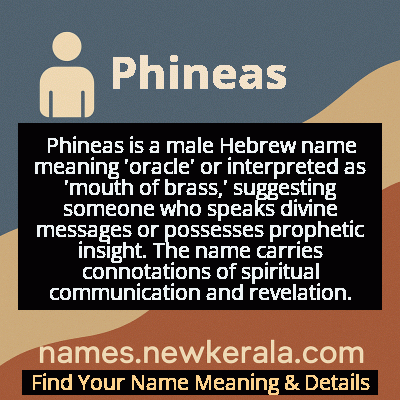Phineas Name Meaning & Details
Origin, Popularity, Numerology Analysis & Name Meaning of Phineas
Discover the origin, meaning, and cultural significance of the name PHINEAS. Delve into its historical roots and explore the lasting impact it has had on communities and traditions.
Name
Phineas
Gender
Male
Origin
Hebrew
Lucky Number
9
Meaning of the Name - Phineas
Phineas is a male Hebrew name meaning 'oracle' or interpreted as 'mouth of brass,' suggesting someone who speaks divine messages or possesses prophetic insight. The name carries connotations of spiritual communication and revelation.
Phineas - Complete Numerology Analysis
Your Numerology Number
Based on Pythagorean Numerology System
Ruling Planet
Mars
Positive Nature
Generous, passionate, energetic, and humanitarian.
Negative Traits
Impulsive, impatient, moody, and can be overly emotional.
Lucky Colours
Red, maroon, scarlet.
Lucky Days
Tuesday.
Lucky Stones
Red coral, garnet.
Harmony Numbers
1, 2, 3, 6.
Best Suited Professions
Military, sports, philanthropy, leadership roles.
What People Like About You
Courage, energy, leadership, generosity.
Famous People Named Phineas
Phineas Gage
Railroad construction foreman
Survived traumatic brain injury that revolutionized understanding of brain function
Phineas Taylor Barnum
Showman and entrepreneur
Founded Barnum & Bailey Circus and pioneered modern entertainment industry
Phineas Quimby
Spiritual teacher
Developed mental healing techniques that influenced New Thought movement
Phineas Fletcher
Poet
Significant contributor to 17th century English metaphysical poetry
Name Variations & International Equivalents
Click on blue names to explore their detailed meanings. Gray names with will be available soon.
Cultural & Historical Significance
Extended Personality Analysis
The name Phineas typically evokes personality traits of intellectual curiosity, creativity, and strong communication abilities, reflecting its meaning as 'oracle' or divine messenger. Individuals with this name are often perceived as visionary thinkers with the ability to see possibilities others might miss, combining intuition with practical innovation. There's an inherent showmanship and enthusiasm associated with the name, likely influenced by P.T. Barnum's legacy, suggesting someone who enjoys inspiring others and bringing creative ideas to life. The biblical roots of the name contribute associations of moral conviction and courage—someone willing to stand firmly for their principles even when challenging conventional thinking. Phineas also suggests a balance between tradition and progress, respecting established wisdom while pushing boundaries through original thinking. The combination of these traits often results in someone who is both a dreamer and a doer, capable of turning imaginative concepts into tangible achievements through determination and persuasive communication.
Modern Usage & Popularity
In contemporary naming practices, Phineas occupies an interesting position as a distinctive yet historically grounded choice that has experienced a modest revival. While never achieving mass popularity, it maintains steady usage among parents seeking biblical names with unique character and intellectual appeal. The name received significant exposure through Disney's 'Phineas and Ferb' animated series, which portrayed the name in a positive, creative context and introduced it to younger generations. Modern usage trends show Phineas appealing particularly to educated, urban families who value both tradition and individuality in naming. It serves as an attractive alternative to more common biblical names like Elijah or Isaiah, offering similar religious heritage with greater distinctiveness. The name's vintage charm, literary associations, and connection to innovation make it well-suited for contemporary parents looking for a name that balances historical depth with forward-thinking connotations.
Symbolic & Spiritual Meanings
Symbolically, Phineas represents the conduit between divine inspiration and human expression, embodying the archetype of the interpreter who translates higher wisdom into earthly understanding. The name carries profound connotations of revelation and insight, suggesting an ability to perceive hidden truths and future possibilities that remain invisible to others. Like the brass referenced in its etymology, Phineas symbolizes both durability and resonance—the capacity to endure challenges while making a meaningful impact through one's voice and vision. The biblical narrative adds layers of moral courage and conviction, representing the willingness to take principled stands regardless of opposition. In a broader metaphorical sense, Phineas symbolizes creative transformation—the power to manifest imagination into reality through determined action and innovative thinking. The name suggests a personality that harmonizes spiritual depth with practical achievement, traditional wisdom with progressive vision, and individual expression with universal understanding.

